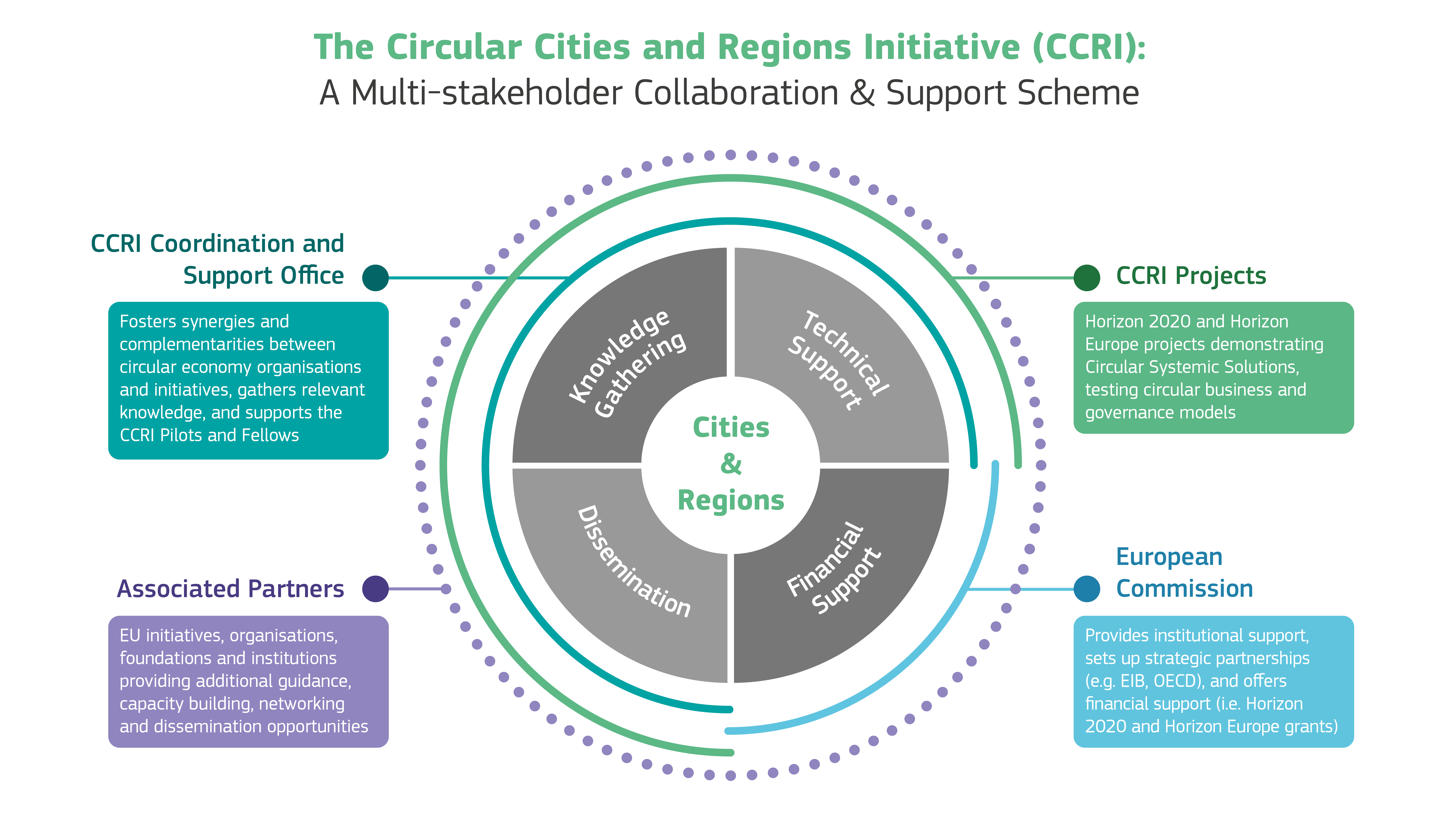The Circular Cities and Regions Initiative (CCRI) is an initiative of the European Commission, launched by the Directorate-General for Research and Innovation as part of the EU Circular Economy Action Plan 2020.
It contributes to the policy objectives of the EU Green Deal, including the 2050 climate neutrality target, and the EU Bioeconomy Strategy. The CCRI is funded by Horizon 2020 and Horizon Europe, the EU’s research and innovation framework programmes.
Combining knowledge sharing, technical and financial support, the initiative assists stakeholders across Europe’s cities and regions, including regional and local authorities, industry representatives, research and technology organisations and civil society. It provides comprehensive support over the whole life cycle of local and regional circular economy initiatives.

The CCRI specifically targets EU cities and regions, and supports them in improving circularity in their economic sectors, value chains and services. They are the closest governance level to Europe’s citizens and sources of innovation, socio-economic transformation and circular ecosystems. They are thereby well placed to drive change towards a sustainable, regenerative and inclusive circular economy.
Many cities and regions are already drawing up their own plans to improve circularity in their economic sectors, value chains and services. Research and innovation initiatives are also helping improve circularity in local systems and economies. While policy tools and funding instruments already exist, there remain many gaps in knowledge, information, skills and awareness.
The CCRI aims to support Europe’s green transition by boosting circularity at local and regional level. It is a rather unique multi-stakeholder collaboration and support scheme.
To build capacity and drive economic growth, the CCRI works to boost collaboration, knowledge sharing, innovation and upscaling, which are essential for making the circular economy more widespread and mainstream.
Delivering concrete solutions can also be challenging, given that economic sectors, value chains and services vary greatly across Europe. The CCRI therefore aims to share replicable best practices to help cities and regions find concrete Circular Systemic Solutions (CSS) that suit their own needs.
The CCRI also provides financial and technical support, including:
- financial support to demonstration projects (through Horizon 2020 and Horizon Europe grants: estimated €200 million over six years);
- financial support for project development assistance (PDA) and technical assistance services for investments in circular economy at local and regional scale, delivered through PDA grants from Horizon Europe and the future Circular Economy Technical Assistance Facility from the European Investment Bank (EIB) (estimated €40-50 million);
- financial support to cross-cutting projects, such as coordination and support actions that address broader themes (e.g. governance models) relevant for the implementation of the circular economy;
- cooperation and support by the CCRI Coordination and Support Office (CCRI-CSO);
- further assistance (non-financial, e.g. advisory services, support on circular economy governance, promotion of good practices) from collaborating organisations, such as the EIB Circular City Centre - C3, the Organisation for Economic Co-operation and Development ‘Programme on the Circular Economy in Cities and Regions’, as well as the European Circular Economy Stakeholder Platform and many other CCRI Associated Partners.
The following diagram illustrates the CCRI Support Scheme, including the support provided by the CCRI, the CCRI-CSO and collaborating organisations and initiatives.

The CCRI-CSO is responsible for facilitating the implementation of the CCRI. Its international team of circular economy experts offers practical, tailor-made support to speed up circular economy implementation in cities and regions.
More specifically, the CCRI-CSO:
- supports cooperation, synergies and complementarities between the CCRI Pilots and Fellows, CCRI Projects, Associated Partners and other relevant stakeholders;
- assists the CCRI Pilot cities and regions with the development of their CSS, as well as supporting good practice exchange and upscaling;
- analyses the main research and innovation gaps, but also the main (policy, technical, regulatory) barriers and drivers to circular economy transition at local and regional scale, and providing policy recommendations to overcome them;
- presents lessons learned from CCRI-CSO activities for further dissemination, communication and awareness raising activities.
Further details on the work of the CCRI-CSO can be found here.
More information about the roles of the Associated Partners and CCRI Projects as well as the support provided to CCRI Pilots and Fellows is available on the CCRI stakeholders page.
Aside from the support provided to and by the CCRI stakeholders, the initiative is open to any European city, region and territorial cluster interested in learning more about the circular economy at local and regional level.
There are many reasons for cities, regions and territorial clusters to get involved, including:
- facilitated knowledge sharing with other front-running cities and regions through various events;
- easily actionable guidance for the development and implementation of Circular Economy Action Plans and CSS, including the respective Circular Economy Investment Plans, through the CCRI methodology;
- quick access to relevant resources to address knowledge or capacity gaps, for example case studies and other relevant knowledge categories (via the support materials section of the CCRI website);
- first-hand information about upcoming funding opportunities;
- facilitated evaluation and monitoring of the implementation process of a CSS through a dedicated self-assessment tool;
- greater opportunities for cooperation with and support from partner initiatives and organisations;
- increased visibility for commitments and actions.
Interested stakeholders who are not participating as Pilots or Fellows may also be able to participate in CCRI events. Make sure you keep an eye on this website to stay up to date on opportunities and activities via the CCRI’s collaborating partners.



